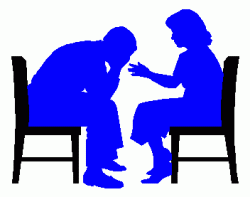Types of Treatment for Prescription Drug Addiction
According to the National Institute on Drug Abuse, prescription drug addiction accounts for a large percentage of the total drug addiction in the United States and the Centers for Disease Control calls prescription drug abuse an epidemic. Because it is possible for a person to become addicted to a prescription drug through using it as prescribed, it is a particularly dangerous problem. Fortunately, scientists and behaviorists have come up with a variety of treatments for this growing problem. These treatments include a variety of options that range from simple counseling to long term inpatient care.
Counseling

Counseling is a popular treatment method for prescription drug abuse.
Counseling is one of the most beneficial treatments for prescription drug abuse. It has one of the highest success rates, particularly combined with medication and other treatments. In counseling therapists, utilize a variety of techniques to help you deal with your addiction. There are several types of addiction counseling. These types are:
- Individual therapy – one on one sessions with a therapist,
- Group therapy – sessions with other addicts and a therapist,
- Cognitive behavioral therapy – teaches a person how to recognize and deal with different moods and thought patterns,
- Contingency management therapy – a reward based counseling for staying clean and sober,
- Motivational therapy – focuses on breaking down walls and denial states to help the addict realize and cope with the addiction,
- Family therapy – utilizes family members to help treat the addiction and solve problems within a family unit.
There are many more types of counseling for addiction and many therapists choose to combine different therapy types to provide the best possible outcomes.
Medications
Many types of prescription drug addiction have different forms of medication to help you overcome the addiction. Doctors normally prescribe this medication and then monitor it very carefully. This includes medications such as methadone for opiate or painkiller addiction and benzodiazepines for alcohol addiction. Many of these medications control or stop cravings and help you return to a normal life.
Sometimes a doctor will also prescribe medication that treats the cause of the addiction. This is particularly true in cases where an underlying mental or physical illness causes the addiction.
Holistic Treatment
There are a vast range of holistic treatments for prescription addiction. Most people who have issues with prescriptions benefit from several different treatments. A few of these treatments are:
- Dietary counseling,
- Vitamins, minerals, and supplements,
- Exercise such as yoga, tai chi, and qigong,
- Holistic counseling methods like guided visualization,
- Meditation techniques, and
- Life counseling.
One of the theories behind holistic treatment for addiction is that the entire person needs to be treated rather than just the addiction. Many holistic treatments support life changes to make sure that you do not become addicted again or just switch one addiction for another.
Inpatient Treatment
Inpatient treatment is one of the most popular forms of drug treatment. When someone refers to court ordered drug treatment, they are referring to inpatient treatment. During inpatient treatment, you are in a facility 24 hours a day 7 days a week. This usually lasts anywhere from two weeks to three months. During this time, they undergo counseling, drug treatment, medication titration, and other treatments depending on what the individual needs. Some people do extremely well in this type of treatment, while others prefer a more relaxed treatment atmosphere. The drug treatment during an inpatient session depends on the individual’s needs and desires. Most inpatient treatment facilities offer counseling, medication management, and holistic therapies as part of an overall program.
Outpatient Treatment
Outpatient treatment combines the different treatment styles in an outpatient setting. This type of treatment can last weeks, months, or even years. In outpatient treatment, you visit a doctor, counselor, or holistic therapist without actually being hospitalized. This type of treatment is extremely popular when you have to attend school or work while receiving treatment for a drug addiction. The only problem you find in outpatient drug treatment is the rate of relapse. Because environmental factors are not controlled, you might be exposed to triggers that cause you to start using the drug. The same freedom that outpatient treatment provides can work against you.
Combined Treatment
As the name says, combined treatment is a combination of both inpatient and outpatient treatment. Most people who participate in combined drug treatment start as an inpatient. They go through detox where they physically withdraw from the drug. Then after they are physically off the drug, they start on the mental recovery as an outpatient. This form of treatment is extremely successful because it combines the advantages of inpatient therapy with the freedom of outpatient treatment. This particular combination has one of the lowest relapse rates of any treatment available.
Regardless of the type of treatment you choose, the important thing is that you are getting help. Prescription drug addiction is very dangerous depending on the drug habit. Both the risk of overdose and the dangers of withdrawing without help contribute to this danger. Some drugs like opiates are relatively harmless to come off but may be deadly to stay on while others such as stimulants are dangerous both on and coming off them. The type of treatment you chose should depend on the type of prescription drug, intensity of use, and your individual preferences and needs. According to the National Institute on Drug Abuse, each person is different and it is important to find the treatment that works best for the individual.












